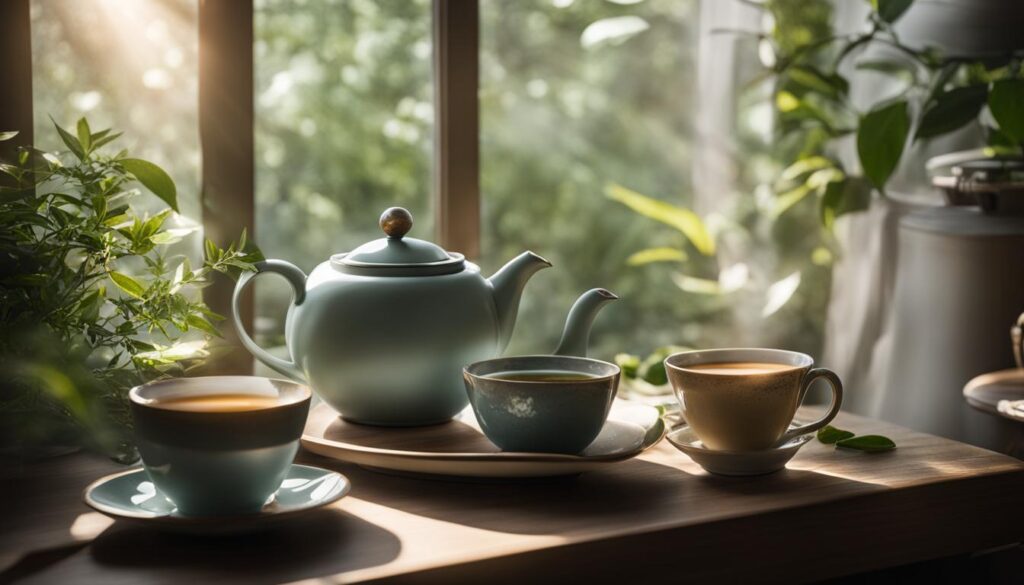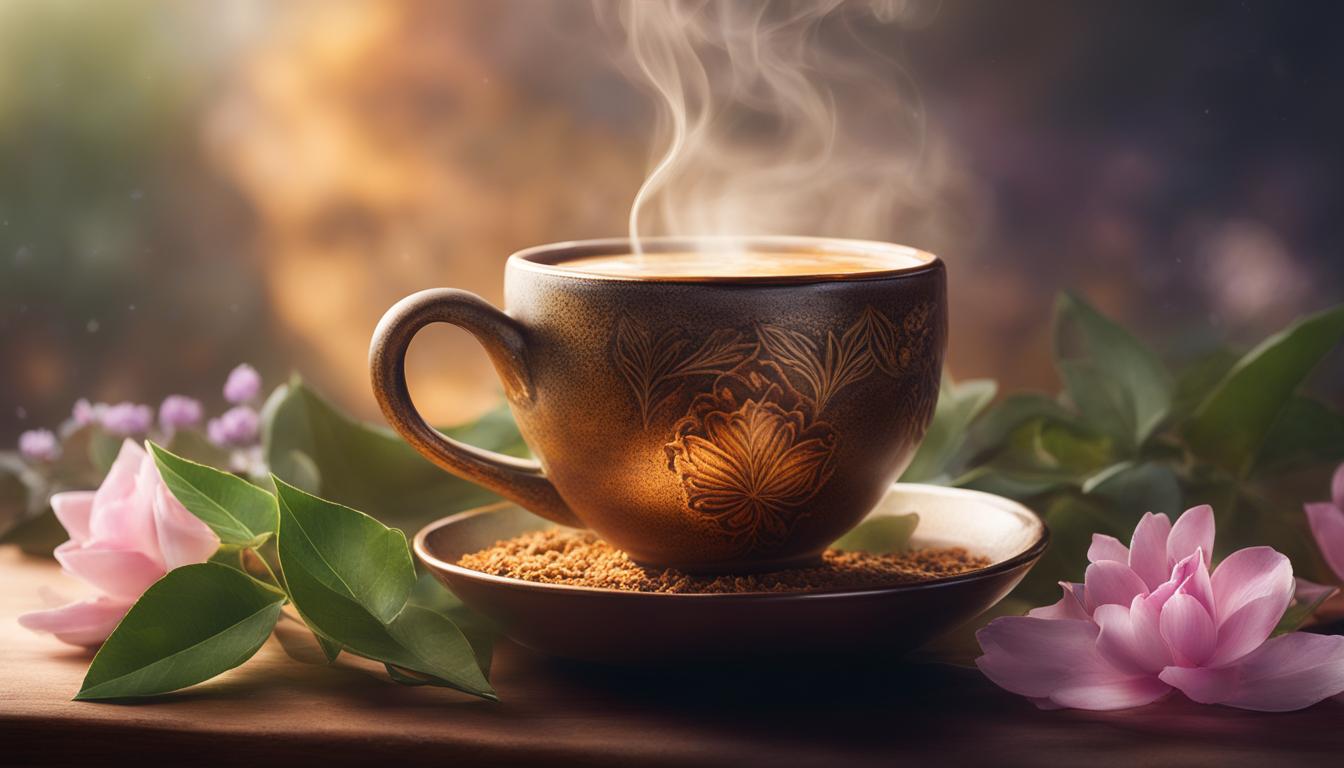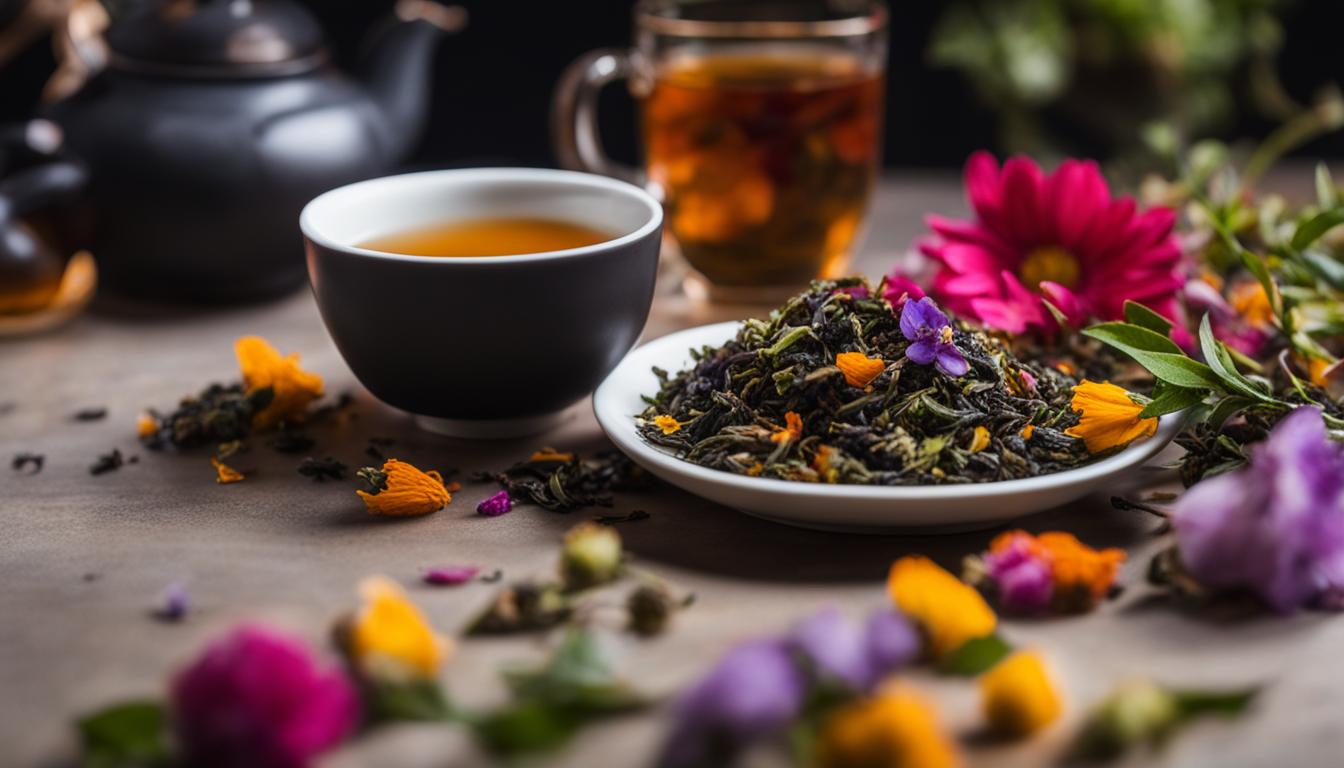Chai and mindfulness, a dynamic duo for an enhanced well-being. Are you ready to infuse your daily routine with a soothing cup of chai and the power of mindfulness? Dive into the world of mindful chai practice and discover how this delightful blend can bring relaxation and tranquility to your life.
Welcome to the realm where Chai and Mindfulness intertwine, creating a harmonious symphony for your senses. Let us embark on a journey where the comforting flavors of chai and the art of mindfulness merge to bring you a moment of serenity amidst the chaos of everyday life.
Indulging in a cup of chai can be more than just a delicious beverage; it can be a gateway to mindfulness. The rich blend of aromatic spices and the warmth of the tea can transport you to a state of presence and awareness. By embracing the mindful chai practice, you can unlock a deeper connection to yourself and the world around you.
Key Takeaways:
- Experience deep relaxation by combining the practice of chai and mindfulness.
- Mindfulness techniques, such as deep breathing and meditation, enhance the benefits of chai.
- Practicing mindful chai involves savoring each sip and expressing gratitude for the tea.
- Mindful chai promotes increased productivity, decreased anxiety, and improved focus.
- Tea mindfulness rituals, rooted in Zen Buddhist practices, offer tranquility and rejuvenation.
What Is Mindfulness?
Mindfulness is a practice that involves being fully present in the moment and cultivating a non-judgmental awareness of one’s thoughts, feelings, and bodily sensations. It is about bringing attention and focus to the here and now, without getting caught up in the past or worrying about the future. By practicing mindfulness, we can tap into a state of calm and clarity, allowing us to navigate life’s challenges with greater resilience and ease.
There are various techniques and exercises that can help us cultivate mindfulness. Deep breathing is a simple yet effective technique that can help anchor our awareness in the present moment. By taking slow, deliberate breaths and focusing on the sensation of the breath entering and leaving our bodies, we can create a sense of grounding and relaxation.
Meditation is another powerful mindfulness practice. It involves sitting quietly and directing our attention to a specific object of focus, such as the breath, a mantra, or a visual image. Through consistent meditation practice, we can train our minds to become more aware of our thoughts and emotions, and learn to observe them without getting caught up in them.
Engaging in mindful activities is another way to incorporate mindfulness into our daily lives. Brewing a cup of tea, like chai, can be a mindful activity in itself. We can pay attention to the aroma, the sound of the water boiling, and the feeling of warmth as we hold the cup. By approaching everyday tasks with a sense of awareness and presence, we can infuse our lives with mindfulness.

The Benefits of Mindfulness
The practice of mindfulness offers a wide range of benefits for our overall well-being. Research has shown that regular mindfulness practice can help reduce stress, anxiety, and depression. It can also improve our focus, attention, and cognitive abilities.
By cultivating mindfulness, we can develop a greater capacity for self-awareness and self-regulation. We become more attuned to our emotions and thoughts, allowing us to respond to them in a more skillful and compassionate way. This increased self-awareness can also enhance our relationships, as we become more present and attentive to others.
Mindfulness can be particularly helpful in managing stress and promoting relaxation. By bringing our attention to the present moment and letting go of worries and regrets, we can experience a greater sense of peace and tranquility. This can have a positive impact on our physical health, as chronic stress has been linked to a range of health issues.
In summary, mindfulness is a practice that involves being fully present in the moment and cultivating a non-judgmental awareness of our thoughts, feelings, and bodily sensations. It can be practiced through techniques such as deep breathing, meditation, and engaging in mindful activities. The benefits of mindfulness include reduced stress, improved focus, and enhanced self-awareness and well-being. By incorporating mindfulness into our lives, we can cultivate a deeper sense of peace, clarity, and connection.
Mindful Chai Practice: Steps to Enhance Your Mindfulness with Chai
When it comes to practicing mindfulness, incorporating chai can be a delightful and effective way to deepen your practice. Mindful chai practice involves simple steps that help you cultivate presence, gratitude, and tranquility. By embracing these steps, you can enrich your mindfulness journey and experience a greater sense of calm and clarity in your daily life.
Step 1: Prepare the Chai Ingredients Mindfully
Begin your mindful chai practice by consciously engaging with the ingredients. Take a moment to appreciate the aroma of the spices, the texture of the tea leaves, and the warmth of the water. As you gather the ingredients, let your senses guide you, immersing yourself fully in the present moment.
Step 2: Pause and Center Yourself
Before proceeding, find a comfortable space where you can sit and focus solely on the practice. Take a deep breath, allowing yourself to let go of any thoughts or distractions. Feel the connection between your breath and the present moment. As you inhale and exhale, bring your awareness to the present, letting go of any tension or stress.
Step 3: Embrace the Sensations of Chai
Hold the warm chai cup in your hands and feel its comforting embrace. Observe the sensations as you bring it closer to your lips. Take a slow and conscious sip, fully experiencing the flavors dancing on your taste buds. Notice the warmth flowing through your body and the calming effect it has on your mind.
Throughout your mindful chai practice, express gratitude for the chai and all the steps involved in its creation. Embrace each moment with a sense of curiosity and wonder. By mindfully savoring your chai, you can elevate your mindfulness practice and find peace within the present.
The Benefits of Mindful Chai
Mindful chai practice offers a multitude of benefits that can enhance your overall well-being and daily life. By combining the mindful principles of being fully present and aware with the soothing ritual of enjoying a cup of chai, you can experience profound effects on your mind, body, and spirit.
One of the key benefits of mindful chai is its ability to increase productivity and focus. By engaging in the practice, you are training your mind to stay present and reduce distractions. This can result in improved concentration, enhanced cognitive abilities, and increased efficiency in your tasks and responsibilities.
Another advantage of mindful chai is its impact on reducing anxiety and promoting relaxation. The act of savoring each sip of chai and paying attention to the sensations in your mouth helps to heighten your sensory experience and cultivate a sense of calm. The warm and comforting quality of chai, coupled with the mindful approach, can alleviate stress and create a soothing environment for mental and emotional well-being.
| Benefits of Mindful Chai | Mindful Chai Practise Effects |
|---|---|
| Increased productivity and focus | Improved concentration and cognitive abilities |
| Reduced anxiety and stress | Promotes relaxation and emotional well-being |
| Enhanced awareness and mindfulness | Heightened sensory experience and presence |
| Improved digestion and gut health | Aids in digestion and boosts the immune system |
| Greater sense of gratitude and connection | Deepens appreciation and fosters connection to self and others |
Mindful chai can also serve as a powerful tool for developing greater awareness and mindfulness in your daily life. By practicing the art of being present and fully engaged in the moment while enjoying your cup of chai, you are training your mind to be more attentive and receptive to the present moment. This can have profound effects on your overall sense of well-being and the way you experience the world around you.
Additionally, mindful chai can have physical benefits as well. Chai is known to contain spices such as cinnamon, ginger, and cardamom, which have been shown to aid in digestion and boost the immune system. By being intentional and mindful while preparing and sipping your chai, you can enhance the benefits of these ingredients and support your digestive and immune health.
Overall, incorporating a mindful chai practice into your daily routine can have transformative effects on your well-being. From increased productivity and focus to reduced anxiety and enhanced awareness, the combination of mindfulness and chai offers a simple yet powerful way to cultivate a deeper connection to yourself, others, and the present moment.

The Origins and Benefits of Tea Mindfulness
Tea mindfulness, also known as the tea ceremony, has its roots in the Zen Buddhist meditation practices of East Asia. This ancient tradition has been passed down for centuries, emphasizing values such as respect, harmony, purity, and tranquility. The tea ceremony provides a sacred space for individuals to connect with themselves and the present moment, offering a respite from the fast-paced nature of modern life.
Engaging in tea mindfulness brings numerous benefits to both the mind and body. By immersing oneself in the ritual of preparing and savoring tea, individuals can experience a sense of calm and relaxation. The focused attention required during the tea ceremony promotes mindfulness, allowing one to fully experience the present moment and cultivate a deep sense of gratitude.
Through tea mindfulness, individuals can reduce stress and anxiety, improve focus and clarity, and enhance overall well-being. Taking the time to slow down and appreciate the flavors, aromas, and sensations of tea can create a sense of mindfulness that carries over into other aspects of life. It provides an opportunity for self-reflection and introspection, offering a peaceful sanctuary amidst the chaos of daily routines.
| Tea Mindfulness Origins | Tea Mindfulness Benefits |
|---|---|
| Rooted in Zen Buddhist practices of East Asia | Reduces stress and anxiety |
| Emphasizes respect, harmony, purity, and tranquility | Improves focus and clarity |
| Provides a moment of respite and rejuvenation | Enhances overall well-being |
“Tea is not just a beverage; it is a portal to mindfulness and tranquility. The tea ceremony allows us to slow down, appreciate the beauty of the present moment, and find peace within ourselves.”
The Tea Mindfulness Ritual
Practicing tea mindfulness involves a ritualistic approach to preparing and savoring tea. One can start by carefully selecting a tea that resonates with their mood and preferences. As the water boils, take a moment to listen to the soothing sound, allowing it to ground you in the present.
Observe the colors of the tea as it brews, noticing the transformation from leaves to liquid. This visual experience can deepen your connection to the tea and heighten your sense of anticipation. Once the tea is ready, hold the cup in your hands, feeling its warmth and appreciating the comfort it brings.
Sip the tea slowly, paying attention to the taste, aroma, and sensations it evokes. Notice the flavors dance on your tongue and the gentle warmth that spreads through your body. Take moments between sips to focus on your breath and center yourself in the present moment.
As you finish the tea ceremony, take a moment to express gratitude for the experience and all the elements that contributed to it. By practicing tea mindfulness regularly, you can cultivate a deeper connection to yourself, find solace in the midst of chaos, and foster a sense of inner calm and tranquility.

Tea Mindfulness Ritual: How to Make a Mindful Cup of Tea
To fully experience the benefits of tea mindfulness, it is important to create a ritual around the process. Follow these simple steps to make a mindful cup of tea:
- Choose a tea that matches your mood and preferences. Whether it’s a soothing herbal blend or an energizing black tea, select a tea that resonates with you in the moment.
- As you start boiling the water, take a moment to listen to the gentle sound of the kettle. Observe the steam rising and savor the anticipation of the tea brewing.
- Once the tea is ready, take a moment to appreciate the colors and aromas that fill the air. Allow yourself to be fully present in this moment of sensory delight.
- Take your first sip of tea slowly, paying attention to the taste, temperature, and texture. Notice how it feels in your mouth and the sensations it evokes. Savor each sip and let the flavors unfold.
Throughout the tea-drinking process, remember to focus on your breath. Take gentle, mindful breaths between sips, allowing yourself to fully immerse in the experience. Wiggle your toes as a way to connect with your body and ground yourself in the present moment.
Finally, when you have finished your tea, clear up mindfully. Take the time to clean your teaware, reflecting on the gratitude for the experience and the moments of tranquility it has brought. With a clear mind and a sense of calm, you can move forward in your day, ready to face whatever comes your way.
5 Tips for Enhancing Your Tea Mindfulness Practice
- Create a dedicated tea space: Set aside a specific area in your home where you can enjoy your tea in peace. Make it a cozy and inviting space that promotes relaxation and tranquility.
- Experiment with different teas: Don’t be afraid to try new flavors and types of tea. Explore the wide variety of options available and discover which teas resonate with you the most.
- Practice mindfulness beyond tea-drinking: Extend the principles of mindfulness to other aspects of your life. Incorporate mindful practices in your daily routines and activities, such as cooking, walking, or even washing dishes.
- Engage in tea ceremonies: Join or organize tea ceremonies in your community. These traditional rituals provide an opportunity to connect with others and deepen your understanding of tea mindfulness.
- Keep a tea journal: Record your experiences and reflections in a tea journal. Document the teas you try, the sensations you experience, and any insights or thoughts that arise during your tea mindfulness practice.
Tea Mindfulness vs. Coffee Rush: A Comparison
| Tea Mindfulness | Coffee Rush | |
|---|---|---|
| Taste | Subtle flavors that can be savored and appreciated. | Bold and intense flavors that provide a quick burst of energy. |
| Caffeine | Moderate caffeine content that promotes alertness without jitters. | Higher caffeine content that can lead to anxious feelings and energy crashes. |
| Routine | A mindful practice that encourages relaxation and presence. | A rushed and hurried experience to quickly get through the day. |
| Effect on Mind | Promotes a sense of calm, focus, and clarity. | Can induce anxiety and restlessness. |
| Social Connection | Encourages sharing and connection through tea ceremonies and sharing experiences. | Often consumed individually and on-the-go. |
“Tea is not a beverage; it’s a form of meditation, a way of life.” – Thich Nhat Hanh
Conclusion
In conclusion, the integration of chai and mindfulness has proven to be a harmonious combination that nurtures our well-being. By embracing the practice of mindful chai, we can tap into a deeper level of relaxation and tranquility in our daily routines. This unique blend of aromatic flavors and mindful awareness not only enhances our immune system and aids digestion but also reduces anxiety and improves cognitive efficiency.
Through the mindful chai practice, we can experience the benefits of increased productivity, improved focus, and a greater sense of connection to ourselves and others. This integration allows us to navigate the complexities of our busy lives with clarity and calmness. By taking the time to appreciate the steps involved in preparing our chai, savoring each sip, and expressing gratitude, we can cultivate a deeper sense of mindfulness and well-being.
Chai and mindfulness go hand in hand, offering a pathway to balance and serenity. The ritual of brewing and enjoying a cup of chai becomes a gateway to mindfulness, providing us with precious moments of tranquility amidst the hustle and bustle of our lives. As we continue to integrate chai and mindfulness into our daily practices, we unlock the potential for increased productivity, reduced anxiety, and a deeper connection to ourselves and those around us.
FAQ
What is mindfulness?
Mindfulness is the state of being fully present in the moment, acknowledging one’s thoughts, feelings, and bodily sensations without judgment.
How can I start practicing mindful chai?
To practice mindful chai, begin by preparing the chai ingredients while being mindful of the aromas and flavors. Sit down, pause, feel the warmth of the chai cup, and focus on your breath. Sip the chai slowly, savoring each sip and paying attention to the sensations in your mouth. Throughout the practice, express gratitude for the chai and all the steps involved in its creation.
What are the benefits of mindful chai?
Mindful chai increases productivity, improves focus, decreases anxiety, and promotes active listening and empathy. It brings about a sense of well-being and a deeper connection to oneself and others.
What is tea mindfulness?
Tea mindfulness is a practice rooted in Zen Buddhist meditation traditions. It emphasizes respect, harmony, purity, and tranquility. Tea mindfulness promotes calm, reduces stress, improves focus, and enhances overall well-being.
How do I make a mindful cup of tea?
To make a mindful cup of tea, choose a tea that matches your mood. Listen to the kettle boiling, observe the colors of the tea as it brews, and sip the tea slowly, paying attention to the taste, aroma, and sensations it evokes. Breathe gently, focus on your breath between sips, and wiggle your toes to connect with your body. Finally, clear up mindfully, ready to face the rest of your day with calm and clarity.





